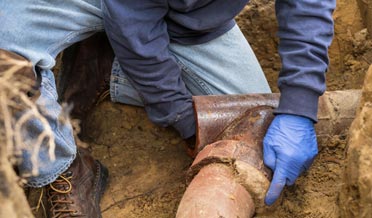Clogged Sewer Line Repair: Keys to Avoid This Common Plumbing Repair
Have you ever flushed the toilet, expecting the water to go down, but panicked to see the water start to rise? Or have you been surprised by standing water in the sink when you need to prepare a meal or get ready for the day? You were probably surprised at how many times you could say “No!” in such a short period. Slow or clogged drains need to be addressed quickly. One key to keeping drains clean is to avoid putting harmful things inside the drains. Here is a list of some things that lead to negative results in your drain.
Be Wise About Soap. It only takes a visit to the health and hygiene section of the local store to realize the large number of products that we put into our drains. Many of these products are rather sticky and leave a film that can be deposited on the walls of drainpipes. A few pointers:
- Not all products leave a film behind
- Bar soap leaves the most film behind, so choose wisely
- The film develops when wastewater stands still, so use plenty of water to wash products away
Toss the Oil. American meals contain a lot of fat, oil, and grease. It is so tempting and very convenient to wash oils down the drain. However, when these oils cool off, they solidify and fill the diameter of the pipe. It is also difficult to remove, so the better decision is to compost the fats or place them in closed containers in the trash.
To Flush or Not to Flush. There is a lot to figure out, so let’s get started.
- Toilet paper and tissue paper usually dissolve by the time it reach the wastewater treatment plant, but make sure the local “bugs” can handle the paper. Also, TP can get caught on any object in the drain line.
- Flushable wipes, paper towels, and baby wipes are not flushable. They do not dissolve. The fibers get caught on even smooth surfaces and contribute to clogs.
- Feminine hygiene products are not flushable.
- Keep foreign items out of the drain—toys, clothing, etc., will quickly create clogs
Try Composting. When garbage disposals were added to kitchens, the idea was to clear food items that might get caught in the drain. They are not to be a chipper/shredder to handle every fibrous vegetable peal, chicken bone, and leftover casserole dish. Sure, the garbage disposal can handle it, but the pipes cannot; food will create a sticky, bad-smelling coating that must be cleaned away. If you have space, a small compost bin is a good alternative, with the bonus of creating topsoil for bedding plants.
Thirsty Roots. Never plant shrubs or trees over existing sewer lines. Roots are designed to absorb water and nutrients from the soil. Growing roots are incredibly strong, commonly breaking through rock and concrete walls or floors. Ideally, the sewer line is completely sealed; but, over time weight and pressure create openings. The wastewater from your home is quite beneficial for trees and shrubs. Before long, the entire pipe is clogged by tree roots. Water will continue to pass through for a while, but TP, food, oil, etc., create a nightmare clog that lets nothing through.
Clogged Sewer Line Repair? We can help with Plumbing Repairs!
Let Doctor Cool help with your Clogged Sewer Line Repair questions before buying your home. Call Doctor Cool & Professor Heat today at 281-338-8751 or email Doctor Cool and let our professional Residential Plumber Contractors assist with all of your Plumbing Repair questions.
